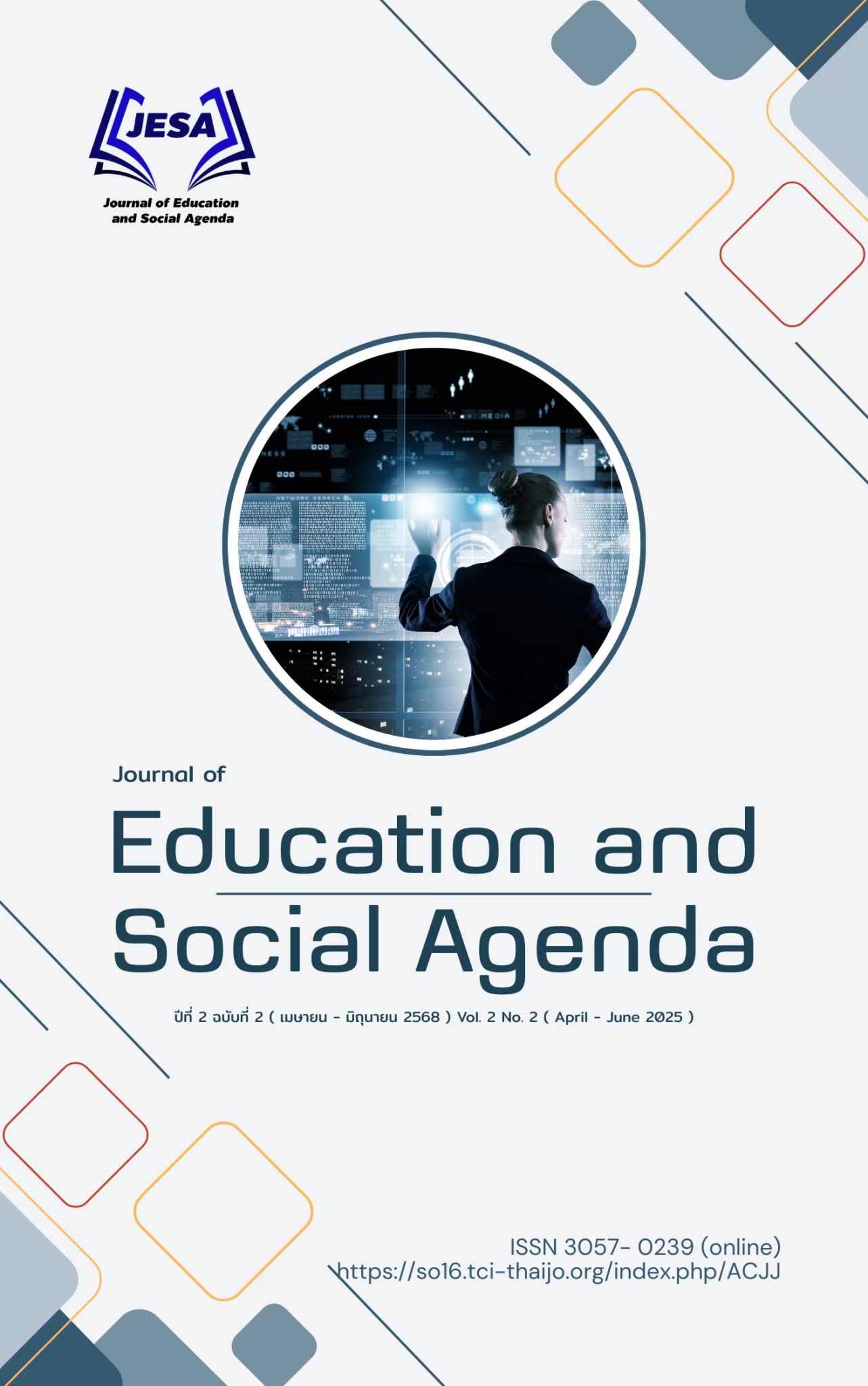Guidelines for Developing Digital Competencies for the Management of Health Promoting Hospital under Ministry of Public Health
Keywords:
Digital Competency , Management , Health Promoting Hospitals , Ministry of Public HealthAbstract
This research aims to 1) investigate the characteristics, 2) identify the components, and 3) propose guidelines for developing digital competencies for managing Sub-district Health Promoting Hospitals under the Ministry of Public Health. The study employed a mixed-method research approach. Quantitative samples included administrators and personnel from Sub-district Health Promoting Hospitals, totaling 1,504 participants, determined through Krejci and Morgan’s table. Qualitative samples comprised 15 hospital administrators selected purposefully based on predetermined qualifications and snowball sampling techniques. Research instruments consisted of interviews and a 5-level rating scale questionnaire. Quantitative data analysis was conducted using exploratory factor analysis, triangulation methods for data validation, and expert panel discussions involving 10 specialists for guideline confirmation. Qualitative data analysis utilized content analysis and descriptive techniques. Statistical methods for quantitative data included percentage, mean, standard deviation, and exploratory factor analysis. Findings indicated: 1) Digital competencies for managing Sub-district Health Promoting Hospitals include four areas: digital literacy, digital utilization, problem-solving with digital tools, and adaptability to digital transformation. 2) Digital competency components for management comprised three main aspects: cognitive, skills, and affective domains, with seven sub-components: computer and digital basics, digital access, digital utilization, digital media creation, digital communication, digital media management, and digital evaluation. 3) Guidelines for digital competency development involved three main components and seven sub-components, achievable through five methods: self-directed learning, online learning, case study analysis, learning via AI, and practical training workshops.
References
กระทรวงสาธารณสุข. (2565). นโยบายการคุ้มครองข้อมูลส่วนบุคคล กระทรวงสาธารณสุข. เข้าถึงได้จาก https://pdpa.dmh.go.th/news/view.asp?id=1
กัญญาวีณ์ โมกขาว, สุจิตรา เหลืองอมรเลิศ, นงลักษณ์ จินตนาดิลก และเนตรชนก ศรีทุมมา. (2560). โมเดลความสัมพันธ์ระหว่างภาวะผู้นำการเปลี่ยนแปลง การสร้างความรู้ และผลการดำเนินงานการจัดการนวัตกรรมของหอผู้ป่วยโรงพยาบาลชุมชน. วารสารพยาบาล กระทรวงสาธารณสุข, 27(3), 163-175.
โครงการสุขภาพคนไทย. (2564). Covid – 19 มหันตภัยร้ายระดับโลก. สุขภาพคนไทย 2564, 112. นครปฐม : สถาบันวิจัยประชากรและสังคม มหาวิทยาลัยมหิดล.
สุชาติ อนันตะ. (2563). การบริหารจัดการภายในองค์การกับการพัฒนาคุณภาพโรงพยาบาลส่งเสริมสุขภาพตำบลในจังหวัดยะลา. วารสารวิทยาศาสตร์สุขภาพ มหาวิทยาลัยทักษิณ, 2(2), 35-46.
Agila-Palacios, M.V., Muñoz-Repiso, A.G.-V. & Ramírez-Montoya, M.S. (2022). Influence of active methodologies: projects and cases in the development of digital competences with mobile devices. Journal of Applied Research in Higher Education, 14(3), 1007-1020.
Bodiako, A.V., Ponomareva, S.V., Rogulenko, T.M., Melnik, M.V. & Gorlov, V.V. (2021). Professional and qualification potential of the digital society: indicative evaluation and systemic management. International Journal of Sociology and Social Policy, 41(1/2), 50-61.
Glenn, J., Chaumont, C. & Villalobos Dintrans, P. (2021). Public health leadership in the times of COVID-19: a comparative case study of three countries. International Journal of Public Leadership, 17(1), 81-94.
Hooi, L.W. & Chan, A.J. (2023). Does workplace digitalization matter in linking transformational leadership and innovative culture to employee engagement?. Journal of Organizational Change Management, 36(2), 197-216.
Isoda, M., Estrella, S., Zakaryan, D., Baldin, Y., Olfos, R. & Araya, R. (2021). Digital competence of a teacher involved in the implementation of a cross-border lesson for classrooms in Brazil and Chile. International Journal for Lesson and Learning Studies, 10(4), 362-377.
Lee, J.J. & Meng, J. (2021). Digital competencies in communication management: a conceptual framework of Readiness for Industry 4.0 for communication professionals in the workplace. Journal of Communication Management, 25(4), 417-436.
Parkatti, A., Saari, T., Tammelin, M. & Villi, M. (2022). Framing digital competence in media work – The case of Finland. International Journal of Sociology and Social Policy, 42(13/14), 15-29.
Phakamach, P., Senarith, P. & Wachirawongpaisarn, S. (2022a). ICT systems development guidelines for educational innovation management of Rajamangala University of Technology in Thailand. Journal of Education and Innovative Learning, 2(2), 109-130.
Phakamach, P., Wachirawongpaisarn, S., Phomdee, R., Sinlapee, A. & Panjarattanakorn, D. (2021). Innovative practices in higher education administration. Proceedings of The Second RMUTR International Conference 2021, July 7-9, 2021. 246-257. Thailand : Rajamangala University of Technology Rattanakosin.
Reddy, P., Sharma, B., Chaudhary, K., Lolohea, B. & Tamath, R. (2022). Information literacy: a desideratum of the 21st century. Online Information Review, 46(3), 441-463.
Schiuma, G., Schettini, E., Santarsiero, F. & Carlucci, D. (2022). The transformative leadership compass: six competencies for digital transformation entrepreneurship. International Journal of Entrepreneurial Behavior & Research, 28(5), 1273-1291.
Trinchero, E., Farr-Wharton, B. & Brunetto, Y. (2019). A social exchange perspective for achieving safety culture in healthcare organizations. International Journal of Public Sector Management, 32(2), 142-156.

Downloads
Published
How to Cite
Issue
Section
License
Copyright (c) 2025 Asia Connect Journal

This work is licensed under a Creative Commons Attribution-NonCommercial-NoDerivatives 4.0 International License.
This article is published under a Creative Commons Attribution-NonCommercial-NoDerivatives 4.0 International License (CC BY-NC-ND 4.0), which allows others to share the article with proper attribution to the authors and prohibits commercial use or modification. For any other reuse or republication, permission from the journal and the authors is required.

